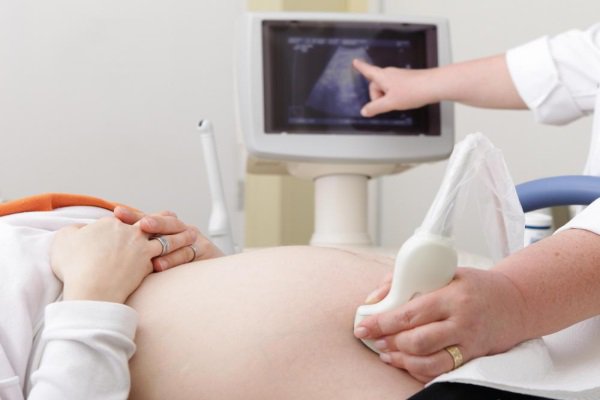Screening for congenital abnormalities in the first 3 months of pregnancy
This is an automatically translated article.
The article was professionally consulted by Dr. Nguyen Anh Tu - Doctor of Obstetric Ultrasound - Prenatal Diagnosis - Obstetrics Department - Vinmec Hai Phong International General Hospital.
Screening for congenital abnormalities in the first 3 months of pregnancy is a combination of fetal ultrasound and maternal blood tests. These prenatal screening tests are done during the first trimester of pregnancy, weeks 1 to 13. The results can help find out your baby's risk of having certain birth defects such as Down syndrome.
1. Congenital screening during the first 3 months of pregnancy
First-trimester screening tests are prenatal tests that provide early information about the risk that a baby may be born with certain congenital conditions due to chromosomal abnormalities, namely: Down syndrome (trisomy 21), sequences of chromosome 18 (trisomy 18).
First trimester screening consists of two steps:
Blood test to measure the levels of two pregnancy-specific substances in the mother's blood - pregnancy-associated plasma protein (PAPP-A) and gonadotropin human chorion (HCG). Fetal ultrasound to measure the size of the space in the tissue at the back of your baby's neck – nuchal translucency measurement. Usually, prenatal screening tests during the first trimester are done between weeks 11 and 14 of pregnancy. The results of these tests are not absolute, but help stratify low, moderate, or high risk to the fetus. From there, this will be the basis for subsequent monitoring in pregnancy, specifying diagnostic screening tests.
First trimester screening consists of two steps:
Blood test to measure the levels of two pregnancy-specific substances in the mother's blood - pregnancy-associated plasma protein (PAPP-A) and gonadotropin human chorion (HCG). Fetal ultrasound to measure the size of the space in the tissue at the back of your baby's neck – nuchal translucency measurement. Usually, prenatal screening tests during the first trimester are done between weeks 11 and 14 of pregnancy. The results of these tests are not absolute, but help stratify low, moderate, or high risk to the fetus. From there, this will be the basis for subsequent monitoring in pregnancy, specifying diagnostic screening tests.

Mẹ bầu được chỉ định siêu âm thai khi thực hiện sàng lọc bẩm sinh khi mang thai 3 tháng đầu
2. What is the purpose of screening for congenital abnormalities in the first trimester of pregnancy?
Screening tests during the first trimester of pregnancy are done to assess a pregnant woman's risk of developing Down syndrome or trisomy 18. Of these, Down syndrome causes lifelong defects in mental development. and the child's social and physical well-being to varying degrees. Besides, trisomy 18 has more serious manifestations and is often fatal for children before the age of 1 year.
On the other hand, the first trimester congenital screening can be considered as the earliest performed as well as directional results early in pregnancy. This will give professionals and themselves and their families more time to make decisions about further diagnostic tests during the next pregnancy, treatment orientation and especially conditions. medical management during and after birth. If the fetus has been predicted to be at high risk for Down syndrome, the mother will also have more time to prepare for the possibility of caring for a child with “special needs.”
On the other hand, the first trimester congenital screening can be considered as the earliest performed as well as directional results early in pregnancy. This will give professionals and themselves and their families more time to make decisions about further diagnostic tests during the next pregnancy, treatment orientation and especially conditions. medical management during and after birth. If the fetus has been predicted to be at high risk for Down syndrome, the mother will also have more time to prepare for the possibility of caring for a child with “special needs.”

Nhằm phát hiện dấu hiệu sản phụ mang thai mắc hội chứng Down hay trisomy 18 là một mục đích của việc sàng lọc trong 3 tháng đầu thai kỳ
However, before screening, women need to be explained what the results will mean for the pregnancy. At the same time, doctors also need to carefully consult, to prevent adverse outcomes that may affect the psychology and health of pregnant women.
3. How is prenatal screening done and is there any risks?
Congenital screening in the first trimester includes blood draw and ultrasound examination.
For the blood test, the technician will need to take a blood sample from you through any vein in your arm. The blood sample will be sent to a laboratory for analysis. You can return to your usual activities immediately.
For the ultrasound examination, the mother will be guided to the examination table and lie on her back, exposing the abdomen. The doctor will place a transducer, a small device that sends and receives sound waves, reconstructing the image of the fetus in the uterus by digitally converting it into an image on a screen. This way, the doctor will see the images needed to measure the size of the space in the tissue at the back of your baby's neck. Similar to the blood draw, the ultrasound is not significantly painful and the woman can return to her normal activities immediately.
In addition, performing these tests does not require any prior preparation. Pregnant women visit antenatal care and take blood samples for testing like regular tests, without fasting or changing clothes. This is essentially a routine prenatal screening test, which is routinely performed in most of the obstetric hospitals of countries around the world. The screening is completely harmless, with no risk of miscarriage or increased risk of other pregnancy complications.
For the blood test, the technician will need to take a blood sample from you through any vein in your arm. The blood sample will be sent to a laboratory for analysis. You can return to your usual activities immediately.
For the ultrasound examination, the mother will be guided to the examination table and lie on her back, exposing the abdomen. The doctor will place a transducer, a small device that sends and receives sound waves, reconstructing the image of the fetus in the uterus by digitally converting it into an image on a screen. This way, the doctor will see the images needed to measure the size of the space in the tissue at the back of your baby's neck. Similar to the blood draw, the ultrasound is not significantly painful and the woman can return to her normal activities immediately.
In addition, performing these tests does not require any prior preparation. Pregnant women visit antenatal care and take blood samples for testing like regular tests, without fasting or changing clothes. This is essentially a routine prenatal screening test, which is routinely performed in most of the obstetric hospitals of countries around the world. The screening is completely harmless, with no risk of miscarriage or increased risk of other pregnancy complications.

Mẹ bầu không cần nhịn ăn trước khi thực hiện sàng lọc trước sinh
First-trimester screening can accurately identify about 85% of pregnant women with Down syndrome. About 5% have a false-positive result, which means the test is positive but the baby doesn't actually have genetic-confirmed Down syndrome at birth.
In order to improve the ratio of "mother round and square baby", the screening for congenital abnormalities in the first 3 months of pregnancy is a routine test, in order to provide early plans for high-risk pregnancies. reduce the burden on family and society.
At Vinmec International General Hospital, there is a package maternity service as a solution to help pregnant women feel secure because of the companionship of the medical team throughout the pregnancy. When choosing Maternity Package, pregnant women can:
The pregnancy process is monitored by a team of qualified doctors Regular check-up, early detection of abnormalities Maternity package helps to facilitate the process. birthing process Newborns get comprehensive care
In order to improve the ratio of "mother round and square baby", the screening for congenital abnormalities in the first 3 months of pregnancy is a routine test, in order to provide early plans for high-risk pregnancies. reduce the burden on family and society.
At Vinmec International General Hospital, there is a package maternity service as a solution to help pregnant women feel secure because of the companionship of the medical team throughout the pregnancy. When choosing Maternity Package, pregnant women can:
The pregnancy process is monitored by a team of qualified doctors Regular check-up, early detection of abnormalities Maternity package helps to facilitate the process. birthing process Newborns get comprehensive care
Please dial HOTLINE for more information or register for an appointment HERE. Download MyVinmec app to make appointments faster and to manage your bookings easily.
This article is written for readers from Sài Gòn, Hà Nội, Hồ Chí Minh, Phú Quốc, Nha Trang, Hạ Long, Hải Phòng, Đà Nẵng.





